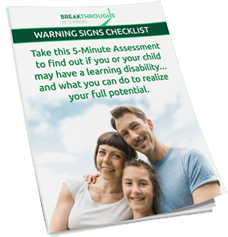
Does it affect life at home, at school or at work?
Take 5 minutes to complete the Warning Signs Checklist and discover whether you or your child could have learning difficulties that are impacting your life, and what to do about it.
Take The Free Warning Signs Checklist! When parents learn of a child’s learning disability it is not uncommon for them to experience a grieving process similar to the stages of grief described by Elizabeth Kubler-Ross. While not grieving a death, there is grief surrounding expectations parents may have held for that child.
When parents learn of a child’s learning disability it is not uncommon for them to experience a grieving process similar to the stages of grief described by Elizabeth Kubler-Ross. While not grieving a death, there is grief surrounding expectations parents may have held for that child.
This is a natural and very forgivable part of human nature. When facing the diagnosis of a learning disability, the best way to handle grief stages is to be aware of them. These stages do not happen the same way for all people or even in the same order. But they give a good blueprint on how one may react after learning of a child’s disability.
Shock
This is the initial emotional outburst. It can include crying, laughter or even a physical outburst.
Denial
This reaction can be summarized by a statement similar to the following: “My child does not have dyslexia. I just need to make her focus on her homework more.”
Denial is the attempt to explain a disability diagnosis into a typical scenario—even stating “my child is lazy” can be preferable to facing the disability at this point. After all, “lazy” can be reversed through discipline and strict routine. Disability may not be entirely reversible and approaching it seems overwhelming at the time.
Bargaining may also be part of this stage, e.g. “If I give my child an extra quiet study room, it will all go away.” Parents may also consult with different specialists in the hopes of reversing the diagnosis.
Anger
Unlike denial, anger sees the reality. It may be verbalized in strong words or parents becoming passive and silent. Parents often assess blame against supportive professionals such as counselors, physicians, or even teachers. Rather than become defensive, professionals in the learning disability field need to recognize this as a positive step to acceptance of the diagnosis.
Resignation and Acceptance
Resignation and acceptance are often presented as different stages but they tend to happen at the same time. Parents start to deal with feelings of guilt and shame regarding the diagnosis and may try to hide the child or change schools. At the same time, or even very shortly thereafter, parents are also looking for solutions to help the child succeed despite the disability. There is overlap and switching between the two mindsets for some, while others may experience these feelings in separate stages.
Eventually, parents invest time with professionals and start to build a team between them and the child’s teachers. All involved start to form a plan to help that child succeed despite the disability. Although with this process, there may still be some shame emerging even as parents start to cope well.
Moving On
After milestones are reached in these stages, parents start to believe in the future and feel open about the child’s learning difficulties. The child may have the diagnosis but the diagnosis will not have them. Engaging in educational therapy will target and develop the specific skills that are week and develop them. A diagnosis is not the end, but an opportunity to recognise the problem, and take action to help your child be successful.
It is not unusual to face grief when facing the fact a child has a learning disability a similar condition, like ADHD, that interferes with school success. Patience with the child during the process of brain training is not the only important item with the diagnosis. Parents also need to be patient with themselves as they learn to accept the new reality and look for ways to help the child move forward and get their breakthrough.
Subscribe to our newsletter and receive regular articles and resources to help you or your child perform better at school, home or work.
suscribe now
Post Your Comment Below